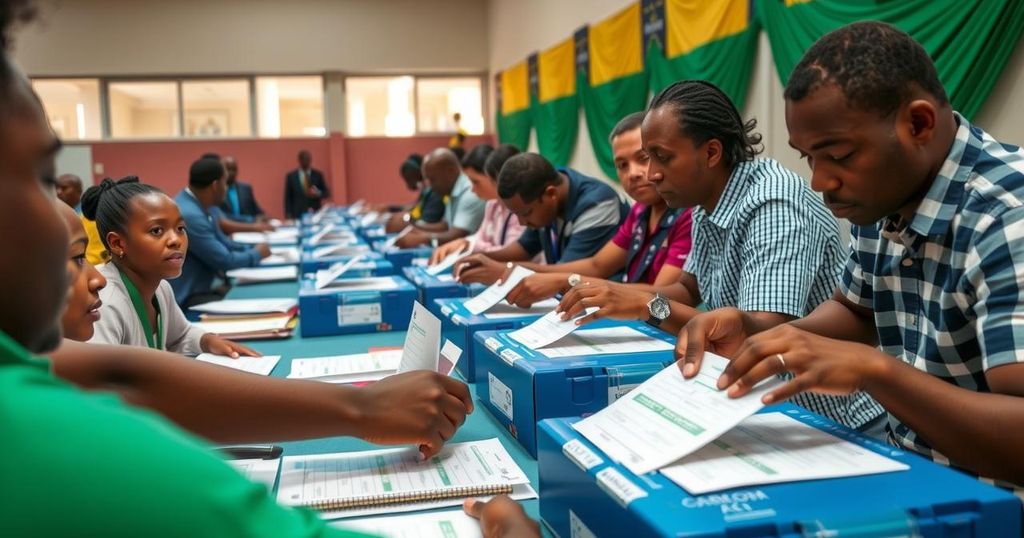World news
2024 ELECTIONS, AFRICA, ALI BONGO ONDIMBA, BILLBOARD, BR, BRICE OLIGUI NGUEMA, COMMITTEE FOR THE TRANSITION AND RESTORATION OF INSTITUTIONS, CORRUPTION, CT, ELECTIONS, GABON, INTERIOR MINISTRY, LIBREVILLE, NATIONAL ASSEMBLY, OLIGUI, POLITICS, UNION NEWSPAPER, VOTER TURNOUT
Fatima Khan
0 Comments
Gabon Referendum Shows Overwhelming Support for New Constitution
Gabon announced overwhelming support for a new constitution, with provisional results revealing that 91.8 percent of voters approved the changes. The constitution limits presidential terms, forbids prime ministers, and requires candidates to have Gabonese parents. The military junta’s influence in promoting the referendum has raised concerns about potential authoritarian leanings. Voter turnout was reported at 53.54 percent without major incidents during the voting process, amid mixed public sentiment about the future.
Gabon has announced early results showing that a substantial majority of voters have approved a new constitution. Provisional figures indicate that approximately 91.8 percent of the 860,000 registered voters participated in the referendum, which was preceded by significant promotional activities on various media platforms by the military authorities. The new constitution introduces limitations on presidential terms, eliminating the position of prime minister while ensuring that presidential candidates must possess Gabonese parentage and a Gabonese spouse.
The interior ministry indicated that voter turnout stood at 53.54 percent, slightly lower than earlier estimates. Polling stations across the country remained incident-free during voting, which concluded at 6:00 PM after a night curfew was extended by two hours. In light of the circumstances surrounding the political environment, transitional president Brice Oligui Nguema expressed confidence in the electoral process, describing it as a significant advancement for the nation.
The constitution aims to prevent any dynastic continuation of power, indirectly excluding Ali Bongo Ondimba and his family from future presidential runs due to familial ties, as the newly established regulations require candidates to have Gabonese ancestry. Critics, however, are concerned that the constitutional changes favor the current military leadership, with allegations that it is a move to consolidate a dictatorship rather than promote democracy. Public sentiment appears mixed, as a significant portion of the populace remains hopeful for the nation’s trajectory despite longstanding unemployment and other societal issues.
With final results expected from the constitutional court, it remains to be seen how these developments impact the political landscape ahead of the anticipated presidential elections in August 2025. The ongoing situation underscores the critical balancing act between governance and public trust as Gabon navigates through this transitional period.
The recent referendum in Gabon is a significant political milestone following the military coup that ousted former President Ali Bongo Ondimba. The proposed constitutional changes aim to reshape the governance structure, particularly regarding the presidency’s term limits and candidacy requirements, in efforts to eliminate the potential for dynastic rule. The backdrop of a political upheaval, fraught with accusations of corruption and poor governance from the previous regime, influences public perception and engagement with the referendum process. Amid the prevailing socio-economic challenges, the endeavor to foster a transparent electoral environment is under scrutiny, especially given the military’s promotional role in the referendum.
In conclusion, the provisional results of Gabon’s constitutional referendum reveal a strong majority in favor of new governance measures aimed at restructuring presidential power and ensuring eligibility criteria that exclude former ruling elites. This pivotal moment reflects the nation’s desire for systemic change following a coup and a prolonged era of centralized power. Despite the optimism surrounding these developments, skepticism persists among critics who argue that the potential for authoritarianism remains. The forthcoming presidential elections will critically test the viability of this constitutional framework in meeting the expectations of the Gabonese people.
Original Source: www.tiogapublishing.com




Post Comment